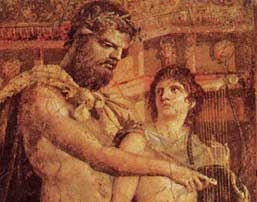Who is this being? There is one centaur who stands out from the lot: Chiron, a demigod born of Kronos (also called Saturn) and Philyra, a nymph he was fucking one day. Just as his wife caught him in the act, Kronos turned himself into a horse, and as a result Chiron was born with an equestrian lower half. But far from being a monster, Chiron was a kind, compassionate soul, devoted to teaching and to study of a wide variety of subjects: archery, warfare, music, poetry, ethics and medicine. Alone among the gods of the Greek myths, he is portrayed as being without some kind of tragic character flaw, such as being unfaithful, deceptive, vain or vengeful, all common properties of Greek deities. His flaw was how he was born, which we can surmise taught him compassion, and created the alienation which allowed him to study and teach as he did. This myth of Chiron was almost forgotten until a tiny planet was discovered in 1977 and named for him, and astrologers, taking notice, began to explore the story and its implications for modern times. In the Chiron myth, for example, we have the issue of whether humanity is an animal, and whether the animal impulse rules. We have the whole meaning of what it means that we are indeed half-animal and half-human. Since then, there has been much discussion in the astrological community as to whether the first centaur planet should be considered a ruler of Virgo, or of Sagittarius. (Some astrologers have even suggested Libra.) Note that each of these signs already has a ruler (the astrological term for planet most closely related to a sign, which assigns it certain privileges in the game of astrology). Whatever our opinions on this matter may be, it remains obvious that the centaur planet has some intuitive association with the sign of the centaur. And it turns out that Sagittarius has a lot in common with the questing spirit of Chiron, with his love for knowledge and teaching, and with his association with very specific issues in a person's life -- less like the more generalized expansive quality of Jupiter (Sagittarius's traditional ruler) and more like the arrow of Chiron. The discovery of this small planet has led to a great deal of information being unearthed about Chiron, and other centaurs which followed, including Pholus (1992) and Nessus (1993). Dieter Koch, the Swiss astrologer, has personally translated the centaur myths from ancient Greek, correcting many of the assumptions of both academic mythology and astrology. Other devoted astrologers, particularly depth psychologist Melanie Reinhart, have given much of their lives to exploring the implications of the Chiron myth in modern times, and working with people on these themes. This is consistent with the Chiron theme of mentorship. Chiron was mentor to a generation of Greek heroes of the Helenic era, including Jason, Heracles, and Achilles. Jason and Heracles were men who endured enormous peril in the service of their cultures, and whose lives tell the story of what you might call ego development within the Western psyche. Like Achilles, one of the great heroes of the Trojan War, Jason and Heracles had their weaknesses and vulnerabilities (Jason being unfaithful to the woman who assisted his quest, and Heracles being something of a mass-murderer who tried to redeem himself), but their activities represent a huge portion of the history of ancient Greece as told in myths. And the myths, of course, are our own stories. How it happened that Chiron, their mentor, the one who prepared them for their challenges and their perils, became at best a minor background figure in these tales remains a mystery, though a fertile one. Chiron was also the teacher to Asklepius, the ancient god of healing and medicine, one of the most important of the non-Olympian gods. In my Dictionary of Classical Mythology he is not even credited with this role. In our culture, we have indeed largely forgotten the role of mentorship. We often forget our teachers and those who generously shared their knowledge with us -- early bosses, coaches and older friends who guided us, or taught us judgment. While there are many people who tear us down, there are many who give us only reason to believe in ourselves, who confront us with the truth, and whose feelings about us do not change with public opinion. They choose not to be threatened by us (such as parents often are). These are mentors. We are often presumed to be "self-made" people when we rise to power and wealth. Yet we never really are -- or if so, then we run the risk of being cut off from tradition and history, and from our community, and in truth, from ourselves. | ||
| |
